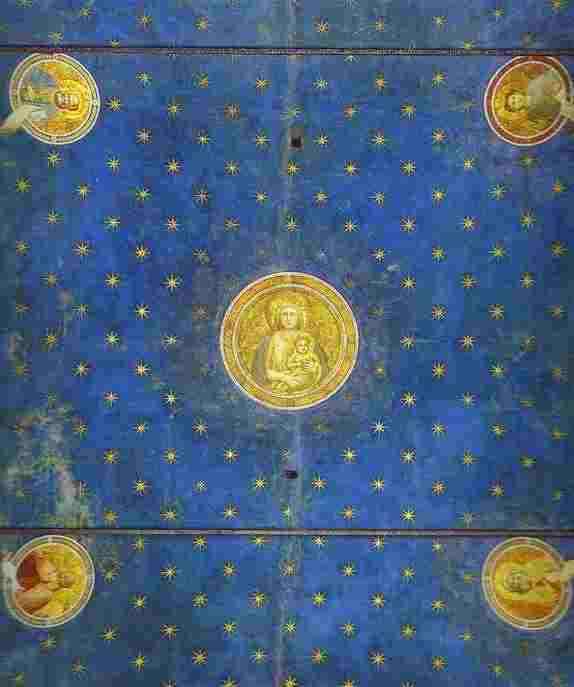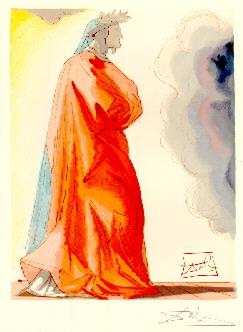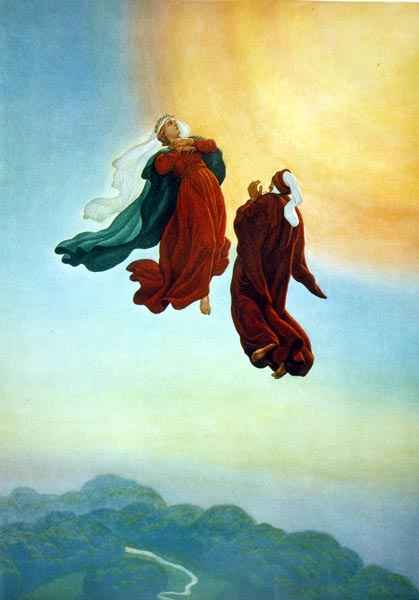 |
 |
 |
|
|
|
|
 |
 |
 |
|
|
|
|
| PAR01 |
|
|
|
|
| ........... | ....... G.GUAITA |
................................. H.W.LONGFELLOW |
...... .D.ALIGHIERI |
....... ... | ....... |
| 1
|
La
glòria
ad
cul
che
'n
cél
al mond guvèrna, par l'ünivèrs la pénetra e risplénd, anti na part da pü e ménu 'nt' n'àuta. |
The
glory of Him who moveth everything Doth penetrate the universe, and shine In one part more and in another less. Within that
heaven which
most his light receives Because in
drawing near to
its desire |
La
gloria
di
colui
che
tutto
move per l'universo penetra, e risplende in una parte più e meno altrove. |
| 4
|
'Ntal
cél
che
püsè
pìa
dla
so
lùce iù stàta mi, e là, iù vist dal ròbi che dòpu iün né 'l sa né 'l pöl ripétji; |
Nel ciel
che più
de la sua luce prende fu' io, e vidi cose che ridire né sa né può chi di là sù discende; |
|
| 7
|
parchè
pü
vzìn'a
'l
va
a
'l
so dezidéri, la nòsa mént a sa sprufònda tant, che la memòria après andè i pöl nén. |
perché appressando
sé al suo disire, nostro intelletto si profonda tanto, che dietro la memoria non può ire. |
|
| 10
|
Però
tüt
lònche
mi
dal
divìn
rëgn iù pudü' fè tezòr antla mè mént adès chi dal mè cant sarà argumént. |
Truly
whatever of the holy realm I had the power to treasure in my mind Shall now become the subject of my song. O good Apollo,
for this last
emprise One summit of
Parnassus hitherto |
Veramente
quant'io
del regno santo ne la mia mente potei far tesoro, sarà ora materia del mio canto. |
| 13
|
O
brav
Apòllo,
a
's
ültim
mè
travài fa che dal to valùr mi tant sìa pién, mè che cunvén par èsi laureà. |
O buono
Appollo,
a l'ultimo lavoro fammi del tuo valor sì fatto vaso, come dimandi a dar l'amato alloro. |
|
| 16
|
Na
cìma
dal
Parnàzo
l'è
bastàmi fin chi; adès ad tüti dùi iù da bzogn par pudéi terminè 's ültim travàj. |
Infino a
qui l'un
giogo di Parnaso assai mi fu; ma or con amendue m'è uopo intrar ne l'aringo rimaso. |
|
| 19
|
Entra,
mi
't
prég,
antla
mè
tèsta
e ispìrmi mè t'è impegnàti a vìnsi an cùla gàra, quànd t'è gavài a Màrsia la so pèl. |
Enter
into my bosom, thou, and breathe As at the time when Marsyas thou didst draw Out of the scabbard of those limbs of his. O power divine,
lend'st thou
thyself to me Thou'lt see me
come unto
thy darling tree, |
Entra nel
petto mio,
e spira tue sì come quando Marsia traesti de la vagina de le membra sue. |
| 22
|
O
divìn'a
virtü',
se
tam
cuncédi tant che alménu l'òmbra 'd cul rëgn beàtu, che 'ncù iù 'n tèsta i pöda figürè, |
O divina
virtù,
se mi ti presti tanto che l'ombra del beato regno segnata nel mio capo io manifesti, |
|
| 25
|
vnì
tam
vidrè
a
cùla
càra
piànta e curunèmi alùra di to fòji che la matéria e ti tam farè dëgn. |
vedra'mi
al piè
del tuo diletto legno venire, e coronarmi de le foglie che la materia e tu mi farai degno. |
|
| 28
|
L'è
cuzì
rar,
o
pàri
che
snu
pìa par al triònf o 'd Cézar o 'd puéta, cùlpa e vargògna di om ad gràma vòja, |
So
seldom, Father, do we gather them For triumph or of Caesar or of Poet, (The fault and shame of human inclinations,) That the Peneian
foliage
should bring forth A little spark is
followed
by great flame; |
Sì
rade volte,
padre, se ne coglie per triunfare o cesare o poeta, colpa e vergogna de l'umane voglie, |
| 31
|
che
duvrìa
èsi
pién
ad
cuntantësa al dìu 'd Dèlfi, quànd fòji dal Penéu i tròvu iün che l'àbia séj ad lur. |
che
parturir letizia
in su la lieta delfica deità dovria la fronda peneia, quando alcun di sé asseta. |
|
| 34
|
Se
di
na
splùa
a
vén
na
fiàma grànda, fòrse dòpu da mi cun migliùr vus, as pregherà parchè Cìrra rispònda. |
Poca
favilla gran
fiamma seconda: forse di retro a me con miglior voci si pregherà perché Cirra risponda. |
|
| 37
|
Da
post
divèrs
nas
ai
murtàj
la
stéila che dà lùce a tüt al mond; ma da cul andùa quàt sèrc' 's ancrùziu cun trè crus, |
To
mortal men by passages diverse Uprises the world's lamp; but by that one Which circles four uniteth with three crosses, With better
course and with
a better star Almost that
passage had made
morning there |
Surge ai
mortali
per diverse foci la lucerna del mondo; ma da quella che quattro cerchi giugne con tre croci, |
| 40
|
cun
migliùr
curs
e
sut
pü
bòn'a
stéila la sort ünìa, e la sìra dal mond 'nt' na manéra migliùr la plàzma e imprònta. |
con
miglior corso
e con migliore stella esce congiunta, e la mondana cera più a suo modo tempera e suggella. |
|
| 43
|
Già
l'àva
fat
matìn
là,
da
chi
séra al sul, spuntànd, e tüt l'éra là biànc cul emisféro, e négra l'àuta part, |
Fatto
avea di là
mane e di qua sera tal foce, e quasi tutto era là bianco quello emisperio, e l'altra parte nera, |
|
| 46
|
quànd
i
vëd
Beatrìs
'nsal
fiànc
mansìn èsi girà, e vardè tant fis al sul: n'àquila mài l'ha pudì fè l'uguàl. |
When
Beatrice towards the left-hand side I saw turned round, and gazing at the sun; Never did eagle fasten so upon it! And even as a
second ray
is wont Thus of her
action, through
the eyes infused |
quando
Beatrice in
sul sinistro fianco vidi rivolta e riguardar nel sole: aquila sì non li s'affisse unquanco. |
| 49
|
E
mè
che
'l
rag'
riflès,
tüti
lu vdùma, surtì dal prim, pö sübit 'l tùrna 'ndré, mè 'l völ al pelegrìn turnè a 'l paìs, |
E
sì come
secondo raggio suole uscir del primo e risalire in suso, pur come pelegrin che tornar vuole, |
|
| 52
|
cuzì
l'at
che
i
vëd,
Beatrìs
l'ha
fat, a l'ha purtà ànche mi a fè l'istès e 'l sul a iù vardà pü dal nurmàl. |
così de l'atto
suo, per li occhi infuso ne l'imagine mia, il mio si fece, e fissi li occhi al sole oltre nostr'uso. |
|
| 55
|
Tant
ai
nòsi
virtü'
l'è
permès
là che chi i pölu pü nén; parchè cul l'éra 'l post fat pròpi sprès par la spécie dl'om. |
There
much is lawful which is here unlawful Unto our powers, by virtue of the place Made for the human species as its own. Not long I bore
it, nor so
little while And suddenly it
seemed that
day to day |
Molto
è licito
là, che qui non lece a le nostre virtù, mercé del loco fatto per proprio de l'umana spece. |
| 58
|
Mi
trop
iù
nén
sustnülu,
mèc
cul
tant, ch'iù pudü' vëdlu zbarlüzè d'antùrn mè 's vëd buiént al fèr sòrti dal föc; |
Io nol
soffersi molto,
né sì poco, ch'io nol vedessi sfavillar dintorno, com'ferro che bogliente esce del foco; |
|
| 61
|
sübit
la
lùce
l'è
zmià
'rdubièsi mè cul che tüt al pöd l'avéisa 'n cél giuntài al sul, ancùra n àutar sul. |
e di
sùbito
parve giorno a giorno essere aggiunto, come quei che puote avesse il ciel d'un altro sole addorno. |
|
| 64
|
Aténta
Beatrìs
an
cui
céi
etèrni fìsa cun i öc' la stàva; e mi an lé i fis i mè dai céi già distacà. |
With
eyes upon the everlasting wheels Stood Beatrice all intent, and I, on her Fixing my vision from above removed, Such at her
aspect inwardly
became To represent
transhumanise
in words |
Beatrice
tutta ne
l'etterne rote fissa con li occhi stava; e io in lei le luci fissi, di là sù rimote. |
| 67
|
Vardand
lé,
mi
'm
santìva
trasfurmè mè 'l Glàuco l'éra vnì güstànd cul'èrba che l'àva fàlu sòciu ai dèi dal mar. |
Nel suo
aspetto tal
dentro mi fei, qual si fé Glauco nel gustar de l'erba che 'l fé consorto in mar de li altri dèi. |
|
| 70
|
Trazümanè
vuléndlu
dì
a
paròli, 's pöl nén; però l'ezémpi a pöl bastè par cuj ch'i avràn la gràsia 'd fèni pròva. |
Trasumanar significar per
verba non si poria; però l'essemplo basti a cui esperienza grazia serba. |
|
| 73
|
Se
mèc
mi
iéra
l'elemént
creà par ültim, o ti Amùr che 'l cél 't guvèrni, ti 't sè che cun la gràsia a t'è ausàmi! |
If
I was merely what of me thou newly Createdst, Love who governest the heaven, Thou knowest, who didst lift me with thy light! When now the
wheel, which
thou dost make eternal Then seemed to me
so much
of heaven enkindled |
S'i' era
sol di me
quel che creasti novellamente, amor che 'l ciel governi, tu 'l sai, che col tuo lume mi levasti. |
| 76
|
Quànd
la
ròva
di
céj
che
't
sempitèrni da lur deziderà, l'è fàmi sénti l'armunìa che 't réguli e 't guvèrni, |
Quando la
rota che
tu sempiterni desiderato, a sé mi fece atteso con l'armonia che temperi e discerni, |
|
| 79
|
l'è
zmiàmi
tant
dal
cél
ilüminà da la fiàma dal sul, che piöva o fiüm an lag cuzì tant larg mài l'àva fat. |
parvemi
tanto allor
del cielo acceso de la fiamma del sol, che pioggia o fiume lago non fece alcun tanto disteso. |
|
| 82
|
La
nuvità
dal
son
e
la
gran
lùce iàn fàmi vnì 'd savéj an dezidéri che prìma mài santì iàva tant fort. |
The
newness of the sound and the great light Kindled in me a longing for their cause, Never before with such acuteness felt; Whence she, who
saw me as
I saw myself, And she began:
"Thou makest
thyself so dull |
La
novità
del suono e 'l grande lume di lor cagion m'accesero un disio mai non sentito di cotanto acume. |
| 85
|
E
lé
che
andrén
ad
mi
mè
mi la vdìva, a pazièmi l'ànim preocüpà, prìma che mi a ciamè, la dörv la bùca; |
Ond'ella,
che vedea
me sì com'io, a quietarmi l'animo commosso, pria ch'io a dimandar, la bocca aprio, |
|
| 88
|
e
la
cumìncia:
"Ti
tat
fè
ignurànt imaginànd zbaglià; ti 't vëdi nén lònche 't vidrìi discariànd l'erùr. |
e
cominciò:
«Tu stesso ti fai grosso col falso imaginar, sì che non vedi ciò che vedresti se l'avessi scosso. |
|
| 91
|
Ti
'n
tèra
t'è
pü
nén,
mè
'ncùra 't
crëdi; ma 'n fülmin, vàrda, che 'l vén giü dal cél, 'l cur nén tant fort mè ti c'al cél at vòli".. |
Thou
art not upon earth, as thou believest; But lightning, fleeing its appropriate site, Ne'er ran as thou, who thitherward returnest." If of my former
doubt I was
divested And said:
"Already did I
rest content |
Tu non
se' in terra,
sì come tu credi; ma folgore, fuggendo il proprio sito, non corse come tu ch'ad esso riedi». |
| 94
|
Se
iéra
dal
prim
dübi
dizvistì dai so paròli dìti suridénd, andrén la réj di n àut iù stàta pià, |
S'io fui
del primo
dubbio disvestito per le sorrise parolette brevi, dentro ad un nuovo più fu' inretito, |
|
| 97
|
e
i
dis:"Dla
prìma
mi
questiòn
tranquìl i son; ma adès am pìa n àut stüpùr: mè i fàza mi a traséndi i corp ligér". |
e dissi:
«Già
contento requievi di grande ammirazion; ma ora ammiro com'io trascenda questi corpi levi». |
|
| 100
|
E
lé,
cumizeràndmi
e
suspirànd, cun i öc' a l'è vardàmi di na màma che 'l fiö gl'ià lì davànti che 'l delìra. |
Whereupon
she, after a pitying sigh, Her eyes directed tow'rds me with that look A mother casts on a delirious child; And she began:
"All things
whate'er they be Here do the
higher creatures
see the footprints |
Ond'ella,
appresso
d'un pio sospiro, li occhi drizzò ver' me con quel sembiante che madre fa sovra figlio deliro, |
| 103
|
Pö
la
cumìncia:"'L
ròbi
tüti
quànti ùrdin iàn tra 'd lur; e cust l'è prinsìpi che 'l fa che 'ntl'ünivèrs as vëda Dìu. |
e
cominciò:
«Le cose tutte quante hanno ordine tra loro, e questo è forma che l'universo a Dio fa simigliante. |
|
| 106
|
L'imprònta
i
vëdu
chi
i
creatüri dla sapiénsa, puténsa e amùr di Dìu che l'è 'l fin ültim dl'ùrdin che mi i dis. |
Qui
veggion l'alte
creature l'orma de l'etterno valore, il qual è fine al quale è fatta la toccata norma. |
|
| 109
|
Pròpi
a
s'
ùrdin
a
iàn
inclinasiòn i creatüri, ugnün'a par na vìa pü vzìn'a o ménu a cul che l'è 'l prinsìpi; |
In
the order that I speak of are inclined All natures, by their destinies diverse, More or less near unto their origin; Hence they move
onward unto
ports diverse This bears away
the fire
towards the moon; |
Ne
l'ordine ch'io
dico sono accline tutte nature, per diverse sorti, più al principio loro e men vicine; |
| 112
|
e
vèrs
an
port
a
l'è
dirèta
ugnün'a par quànt l'è larg al mar a dl'ezisténsa; e tüti iàn l'istìnt che i fa da guìda. |
onde si
muovono a
diversi porti per lo gran mar de l'essere, e ciascuna con istinto a lei dato che la porti. |
|
| 115
|
L'è
cust
che
'l
pòrta
'l
föc
anvèr la lün'a; cùsta la fòrsa che 'nti animàj la pùsa, cust la tèra a tén strëta an lé e ünìa. |
Questi ne
porta il
foco inver' la luna; questi ne' cor mortali è permotore; questi la terra in sé stringe e aduna; |
|
| 118
|
E
nén
mèc
i
natüri
che
ién
fòra dl'inteligénsa l'arc dl'istìnt saiëta, ma cùli che intelèt lur iàn e amùr. |
Nor
only the created things that are Without intelligence this bow shoots forth, But those that have both intellect and love. The Providence
that regulates
all this And thither now,
as to a
site decreed, |
né
pur le
creature che son fore d'intelligenza quest'arco saetta ma quelle c'hanno intelletto e amore. |
| 121
|
La
pruvidénsa
che
tüt
cust
sistéma, l'ha fat 'd la lùce sùa tranquìl cul cél che an lü 'l cumprénd la pü velòce sféra; |
La
provedenza, che
cotanto assetta, del suo lume fa 'l ciel sempre quieto nel qual si volge quel c'ha maggior fretta; |
|
| 124
|
e
adès
là
sü,
al
post
prestabilì, an pòrta la virtü' di cùla còrda che lònche tìra, sémp spedìs al sëgn. |
e ora
lì,
come a sito decreto, cen porta la virtù di quella corda che ciò che scocca drizza in segno lieto. |
|
| 127
|
Mè
la
fùrma
nén
sémp
la
va
d'acòrdi cun l'intensiòn che l'àva 'l so autùr, par la matéria sùrda antal rispòndi, |
True
is it, that as oftentimes the form Accords not with the intention of the art, Because in answering is matter deaf, So likewise from
this course
doth deviate (In the same wise
as one
may see the fire |
Vero
è che,
come forma non s'accorda molte fiate a l'intenzion de l'arte, perch'a risponder la materia è sorda, |
| 130
|
cuzì
di
vòlti
dal
so
curs
sa
scòsta la creatüra lìbera e padròn'a da girè, se la völ, da n'àuta part; |
così da questo
corso si diparte talor la creatura, c'ha podere di piegar, così pinta, in altra parte; |
|
| 133
|
e
giüst
mè
che
'd
na
nìvula
vén giü al föc, cuzì l'inclinasiòn ad prìma an tèra vén, devià da 'n fàus piazì. |
e
sì
come veder si può cadere foco di nube, sì l'impeto primo l'atterra torto da falso piacere. |
|
| 136 | Ti
dònca
't
dévi
nén,
se
i
razòn bén, stüpìti da 'ndè sü, l'è natüràl mè 'l calè giü di 'n fiüm da 'l mont al piàn. |
Thou
shouldst not wonder more, if well I judge, At thine ascent, than at a rivulet From some high mount descending to the lowland. Marvel it would
be in thee,
if deprived Thereat she heavenward turned again her face. |
Non
dei più
ammirar, se bene stimo, lo tuo salir, se non come d'un rivo se d'alto monte scende giuso ad imo. |
| 139 | Stüpùr
farìa
pütòst
se
sénd
ti
sénsa anpedimént, 't füisi 'n tèra rastà, mè 'n tèra 'l vëdi nén 'ndè sü la fiàma". |
Maraviglia sarebbe
in te se, privo d'impedimento, giù ti fossi assiso, com'a terra quiete in foco vivo». |
|
| 142 | Pö lé l'ha ausà la fàcia vèrs al cél. | Quinci rivolse inver' lo cielo il viso. |